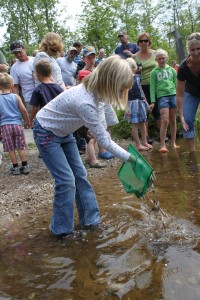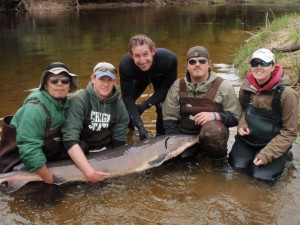
Participant releases a sturgeon into Black Lake during the annual sturgeon release. Courtesy of Black Lake Sturgeon Project
Though it is endangered, the lake sturgeon isn’t off the hook. You can still fish for it and even spear it through the ice.
But the Michigan Department of Natural Resources has limited the fishing of the species to specific areas, rivers and lakes. These include Black Lake, Otsego Lake and St. Clair River.
Experts say fishing sturgeon happens in areas where there is a healthy population.
“Harvest only occurs on river systems where it has been determined by state and tribal biologists that the fishery is able to support fishing,” said John Bauman, a Michigan State University Molecular Ecology Laboratory research technologist. “Harvest of sturgeon in these locations where populations are able to support a fishery also support local economies, Great Lakes’ culture and future environmental efforts.”
Pursuing endangered species is not confined to lake sturgeon. You can hunt moose in Minnesota although their numbers are declining.
Why should people hunt such species?
“One of the arguments for saying yes, we should be allowed to hunt them in a limited way, is that ‘Look, they’re destined for extinction anyways and hunting them is not going to make it worse,’” said John Vucetich, associate professor at Michigan Technological University’s School of Forest Resources and Environmental Science.
Folks say the cultural value of hunting the moose should be honored because it’s not going to change the outcome in any significant way, he said. They argue the moose are still going to go extinct, but this way, hunters benefit.
Tradition has a role in the hunting of species.
“I do know that hunting or fishing, and of a certain species, is often thought to be a part of a given culture,” said Michael Nelson, professor of environmental ethics and philosophy at Oregon State University. He pointed out how deer hunting is a big part of life in the Midwest.
Though deer are not endangered, the tradition behind hunting them extends to endangered species like moose and sturgeon.
However, the hunting of an endangered species is not challenge free.

One of the research groups involved in the Black Lake Sturgeon Project. Courtesy of the Black Lake Sturgeon Project
“For the fisheries managers, the challenge is to figure out how much harvest can the population support while you’re still trying to grow the population,” said Thomas Coon, Michigan State University professor and director of the Michigan State University Extension.
For example, the first Michigan wolf hunt in 2013 sparked controversy. The species was taken off the endangered list earlier in the year, but their population remained below 1,000 individuals. Groups like Keep Michigan Wolves Protected were against killing the wolves while others argued hunting the species would better protect livestock and pets.
Killing endangered species is an ethical question.
“Any proposal to hunt or not hunt animals would fall within the realm of ethics,” said Nelson.
“To be honest, I’m not sure I can imagine a good argument to support the conclusion that we ought to hunt species that are threatened or endangered, though I’d be willing to entertain and examine them,” he said.
Not everyone agrees.
“Ethics aren’t legislative,” said Coon. “You’re going to have people with different perspectives on what is the ethical thing to do.”
The issue of hunting endangered species even comes down to that of respect.
“We should live by some set of virtues and one virtue might be respect,” said Vucetich. “And it just doesn’t seem like a respectful thing to say that we’re going to hunt something that’s on its deathbed.”
Some experts say there are cultural reasons to allow a limited take of rare species.
“From a fisheries manager’s perspective, on the one hand you have a responsibility to the fish population and trying to restore it,” said Coon.
On the other hand, it’s a public resource and you have the responsibility to the public to allow them to continue a tradition embedded in their culture, he said.
For example, some Native American tribes consider the sturgeon a large part of their culture and history. A band of the Pottawatomi Indians of the Gun Lake Tribe used to fish the species as a family activity. In fact, when the tribe hid in the 19th century to avoid being removed from their home by settlers, they survived by spearing sturgeon. The species holds a cultural weight within their society.
The question of allowing the hunting of an endangered species, especially in the case of the lake sturgeon, also involves cooperation.
“There are many groups devoted to the recovery and enhancement of sturgeon populations here in Michigan and around the Great Lakes,” said Bauman. “What makes these groups so unique is that everyone wants the same thing: a future with abundant sturgeon populations for future generations to enjoy and live in harmony with. So, the balance is provided by encouraging biologists, stakeholders, etc. with opportunities to work together to make sure sound management decisions are made.”
These groups and the public must come together to decide what would be best for the sturgeon population, if they should be fished or not as well as the cultural implications of the decision.
And to decide, people need to be informed.
We can’t use the excuse that decisions are difficult to make as a copout for not doing the hard work, said Vucetich. Making a choice depends on doing your homework.
“At some point, I think we all have to pass judgment,” he said.
And awareness won’t come easily.
“I think one of the things that makes this topic challenging is that we don’t really seem to know what is a threatened and endangered species, which means that we don’t really seem to know what is a recovered species,” said Nelson.
“We have so much hard thinking to do,” he said.
Pingback: Pursuit of endangered species hooked on ethics, culture – Great Lakes Echo